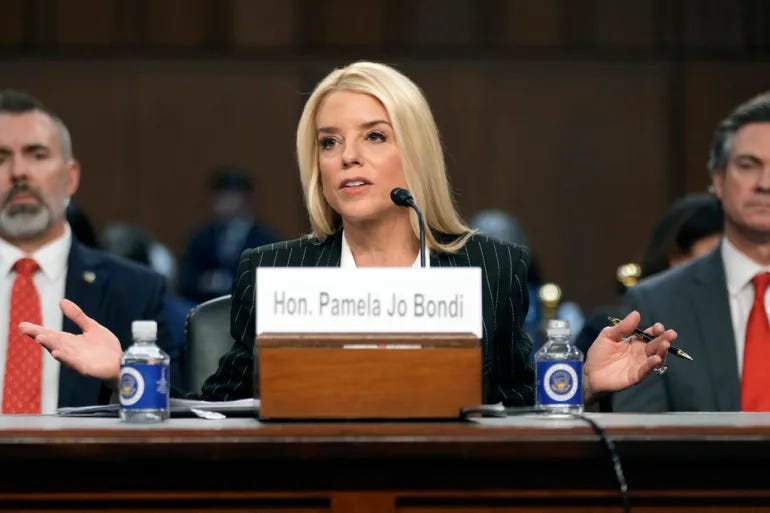Key Takeaways from Trump's Nominees Facing US Senate Confirmation Hearings
Figures like Pam Bondi and John Ratcliffe face intense questioning, with concerns about political bias and the prosecution of Trump’s rivals.
The US Senate has continued to examine nominees for President-elect Donald Trump’s cabinet, with a series of heated hearings on Wednesday as lawmakers grilled candidates about their qualifications, political views, and future plans. Among the six nominees questioned were prominent figures like Florida Senator Marco Rubio, who has been tapped for Secretary of State, and former Florida Attorney General Pam Bondi, who is nominated to become the next Attorney General.
These hearings are part of the broader effort by Republican leaders to ensure a smooth transition into Trump’s second term, which is set to begin next week. With Republicans holding a slim majority in the Senate (53 to 45), the confirmation process has been relatively straightforward, but contentious nominees will need as many votes as possible to secure approval.
Here are the key takeaways from Wednesday’s confirmation hearings:
Marco Rubio: A Hawkish Foreign Policy Stance
During his testimony, Senator Marco Rubio strongly emphasized his commitment to putting US interests above all else, should he be confirmed as Secretary of State. Rubio, known for his hardline stance on foreign policy, labeled China as the biggest threat the US faces in the 21st century.
“If we don’t change course, we will live in a world where much of what matters to us—our security and health—will be subject to whether China allows us to have it,” Rubio said. He criticized China for its alleged unfair practices and called for a more aggressive US approach.
While Rubio reaffirmed his belief in strong alliances, particularly NATO, he echoed Trump’s stance that other NATO countries should contribute more to their own defense. “The NATO alliance is essential,” Rubio said. “Without it, much of Europe would have fallen victim to aggression.”
John Ratcliffe: Assurance of No Political Bias at the CIA
John Ratcliffe, Trump’s pick to lead the CIA, faced questions regarding potential political influence on intelligence operations. Senators expressed concern that his past loyalty to Trump could result in politically motivated actions at the CIA.
Ratcliffe, a former federal prosecutor and former Director of National Intelligence, assured lawmakers that he would uphold the agency’s independence. "We will never allow political or personal biases to affect our analysis," Ratcliffe vowed. “Our goal is to provide insightful, objective intelligence.”
However, he was directly questioned about whether he would impose a political litmus test on CIA staff, to which Ratcliffe firmly responded, “No.”
Pam Bondi: Avoiding Questions on Political Prosecutions
Bondi, Trump’s nominee for Attorney General, faced intense scrutiny over concerns that she might use the Department of Justice to prosecute Trump’s political rivals. Trump has long stated that he intends to target political opponents during his second term, which raised alarm among Senate members.
When asked about specific investigations, particularly into former Special Counsel Jack Smith, Bondi was non-committal. “It would be irresponsible of me to make a commitment on anything,” she responded. She did state that “politics should be removed from the justice system” and insisted that no one should be prosecuted for political reasons.
Bondi has previously supported Trump’s claims of election fraud in 2020, and when asked about pardons for those involved in the January 6 Capitol insurrection, she said she would approach each case individually.
Sean Duffy: Focus on Transportation and Boeing Accountability
Sean Duffy, nominated to be Secretary of Transportation, focused on modernizing the transportation industry during his testimony. Duffy proposed finding ways for electric vehicles (EVs) to contribute to road maintenance funding, which is traditionally supported by gasoline taxes.
Duffy also commented on Boeing, which has faced multiple safety scandals and fraud charges. He expressed concerns over the company’s safety practices and emphasized the need for Boeing to regain global trust. “We need to ensure they are implementing their safety plans,” he stated, noting the importance of holding the company accountable to restore confidence in its products.
As Trump’s cabinet nominations continue to be scrutinized, these hearings highlight the challenges and controversies surrounding the incoming administration’s leadership team. While some nominees, like Ratcliffe and Rubio, are expected to pass confirmation with little trouble, others, particularly Bondi, will face a tougher path as senators weigh the potential implications of their appointments on the independence of the Department of Justice and the future direction of US foreign policy.


